Environmental Pollution |
Ideas to reduce environmental pollution
Environmental pollution prevention is the obligation of HSE practitioners. Here are the ideas to reduce environmental pollution in the organization.
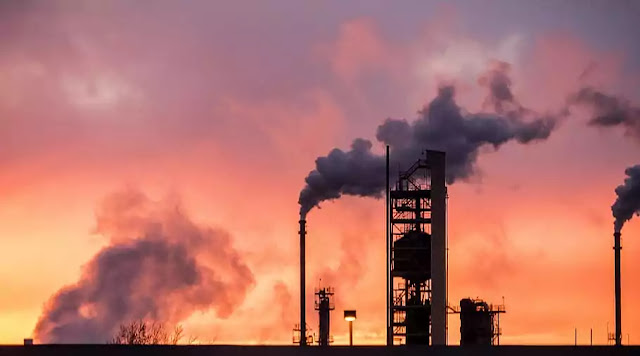 |
| Environmental Pollution |
Environmental Pollution - We all are aware of current worldwide concern is environmental pollution and how different types of pollution such as land pollution, water pollution, air pollution, etc. are affecting to glob. Prevention of pollution is one of the obligations of the HSE practitioners. To identified the main causes of pollution during the activities, aspect and impact assessment to be carried out within the organization.
Here are the ideas to reduce environmental pollution and control the effects of environmental pollution within the organization, which is beneficial to protect the environment.
Environmental Pollution reduction ideas
Obey the government Environmental Regulations
There are several environmental regulations formed by
the government to reduce the pollution, according to the nature of your organization or as per the legal register, all
applicable regulations must be identified and implemented.
These relevant
regulations and its requirements should be complied within the organization to fulfill the legal
requirement, breaching to the requirements such as releasing excessive SOX, NOX into the air, releasing
higher PH level / contaminated water without treatment, landfilling without permission, etc. may
impose disciplinary citations by the pollution control board.
The regulation requirements and parameters may differ from
state to state, thus visit your state official pollution control board or
central pollution control board web site and collect the information before
initiate new project, expansion or major modification in organization.
Identify the ozone depletion gases in organization
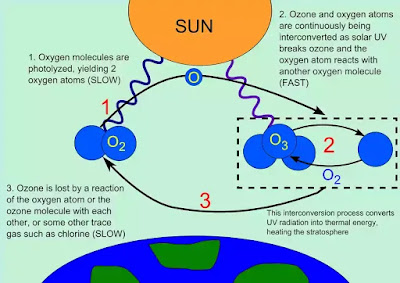
Ozone layer depletion
Many of industries are using various chemical compound
containing gaseous chlorine and bromine such as CFCs, halons, carbon
tetrachloride, methyl chloroform, and methyl bromide, etc., releasing of these
gases in the atmosphere can damage or gradually thinning the earth protective the ozone layer, the ozone layer which is very crucial to prevent the amount of
ultraviolet (UV) radiation to reach at earth surface from the sun.
Ozone depletion gases may increase the amount of ultraviolet
(UV) radiation on earth, which increases the rate of global warming, skin
cancer, genetic and immune system damage, other various diseases.
The prevention of these gases may help to protect the earth’s
ozone layer and reduce the global warming effect on the earth. To protect and enhance the ozone layer
several international agreements legislated to stop the production and use of
ozone-depleting chemicals in industries. As a result of constant international
collaboration on this concern, the ozone layer is likely to improve over time.
Promote to use renewable
resources
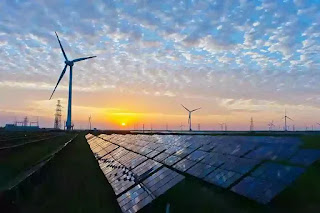
Renewable Natural resources
A renewable resource is a resource which can be used
repetitively and changed naturally. Renewable energy almost never ended, for
example, sunlight, solar energy, wind, oxygen, freshwater, and biomass.
Atmospheric water
generator
The atmospheric water generator is the latest technology
that produces clean drinking water from the atmosphere, this AWG basic concept
is condensates the humidity from the air and provides clean drinking water with
added mineral, and also it is available in a wide range of capacity from 100 to
1000 liter per day.
Roof skylight in
industries
The skylight can be defined as a special type of space
provided in the roof or shed of the structure shielded with a translucent or
transparent material to allow natural sunlight to come into the premises
directly during the daytime.
Enabling the premises with roof skylight can reduce the huge
amount of electricity and its costs for the illumination at premises during the
daytime.
Wind turbine
ventilator
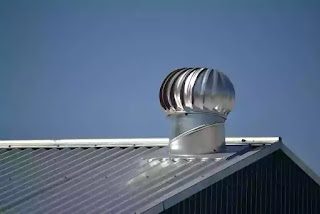
Wind Turbine Ventilator
Wind turbine ventilators are close as the name indicates,
they are a ventilator that is driven by the wind to create effective
ventilation in the premises. Wind turbine ventilator works on wind assisted
ventilation and to operate it no electricity required. Turbine ventilators are
with round metal vents fins in them. Even in just a little bit of wind can be
sufficient for the turbo ventilator to rotate. The faster the wind, the quicker
the turbine will rotate and exhaust the contaminated air from the premises.
Use of solar &
wind energy to produce electricity
Solar power is the transformation of energy from sunlight into electricity,
whichever directly using photovoltaics (PV), indirectly using intense
solar power, or a combination. Photovoltaic cells change light into
an electric current using the photovoltaic effect.
The wind turbine is a device which rotates with the help of wind
and convert wind kinetic energy to electrical energy.
These both are the greatest renewable source to produce
electricity at industrial premises, but electricity consumption is much higher
due to various activities in the industries, thus it is not possible to
completely rely on this source, but up to some extent, these sources can be
helpful to reduce the consumption of the main source of electricity.
Conservation of
natural resources and energy
Natural resources are resources that naturally exist without
effort of humankind, for example, water, land, air, Fossil fuel, solar energy, wind,
trees etc.
Natural resources may be divided into two types on the basis
of origin,
Biotic – The biotic natural resources are obtained from the
biosphere (living and organic materials), for example, forest, animals, fossil fuels,
petroleum, coal, etc.
Abiotic – The abiotic natural resources are obtained from nonliving
and non-organic material, for example, land, water, air, heavy metals, gold,
iron etc.
Many natural resources can be categorized as renewable and
non-renewable,
Renewable natural resources – Which can be replenished easily
by naturally, their quantities are not affected by human consumption and these
are available constantly, for example, solar energy, air, water, etc.
Non-renewable resources - Which cannot be replenished by naturally
(formation is extremely slow), their quantities are affected when their rate of
consumption exceeds, for example, forests, fossil fuels, heavy metals, coal, petroleum
etc.
Adequate measures shall be implemented to reduce the consumption
of non- renewable energy such as save electricity, save water, save fuel, reduction
in papers, reduction in plastics, etc.
Waste management and
reduction at work site
Wastes are unwanted or useless materials which is discarded after
primary use, or is worthless, defective and of no use.
There are kind of waste according to form such as,
Solid waste – plastics,
Styrofoam containers, bottles, cans, papers, scrap iron, and other trash.
Liquid waste - domestic
washings, chemicals, oils, wastewater from ponds, manufacturing industries and
other sources.
Waste are further divided as per their properties such as,
Bio-degradable –
which can be degraded and that are less affected to the environment, for example - paper,
wood, fruits, etc.
Non – biodegradable
– Which cannot be degraded and that are very affected to environment, for
example - plastics, bottles, old machines, cans, Styrofoam containers,
electronics material etc.
Waste are classified according to their effects on human health
and environment such as,
Hazardous waste -
Substances unsafe to use commercially, industrially, agriculturally, or
economically and have any of the following properties- ignitability, corrosively,
reactivity & toxicity.
For example – Medical waste, chemical waste, radioactive
waste etc.
Non Hazardous waste
- Substances safe to use commercially, industrially, agriculturally, or
economically and do not have any of those properties mentioned above. These
substances usually create disposal problems.
For example – Food waste, organic waste, etc.
Waste management hierarchy can be used to evaluate the processes
to control waste.
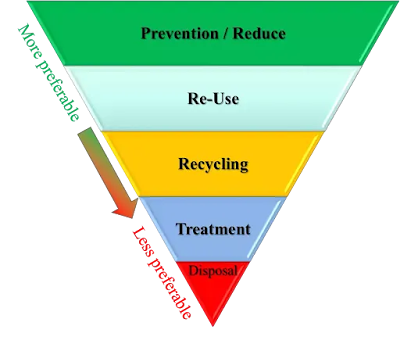
Waste Management Hierarchy
Implement a policy for reducing paper or other waste to
duplex all draft reports and by preparing training manuals and personnel
information available electronically. Disposal of waste is the least effective
solution and this process will impact on the environment.
Spill prevention
in to the environment
Accidental spill or release of any harmful products in the
air, water or land can damage or impact to the environment, all hazardous
substances should be identified and adequate measures shall be taken to prevent
spillage or release in the environment to avoid pollution.
Following factors shall be considered for spill prevention
measures,
- Identify harmful materials for human health and the
environment
- Storage of material
- Allowable storage quantity of material
- Storage arrangement & containers
- Secondary containment
- Spill prevention plan or Emergency response procedure
- Spill control team
- Safe disposal of contaminant
Implement a routine
maintenance schedule
To increase the efficiency of machines routine/preventive
maintenance schedules should be implemented within the organization. It can
improve the life span of a machine and reduce the breakdown time as well,
Upgradation with technology
Antiquated technology or old machines may consume more
energy and pollute the environment in different ways such as excessive noise
pollution, and vibration, etc., thus modification in the technology or
up-gradation in machinery shall be introduced for example automation to reduce
energy consumption, changing lights into led, sensors to activate or stop
machines etc. to avoid pollution in the
environment.
These are the ideas to reduce pollution and protect our
environment effectively, meanwhile it will directly or indirectly increase the
productivity and revenue in the organization.
If you have any other creative ideas which will help to
reduce pollution in the environment, please do comment and share with all to protect the environment.
These relevant
regulations and its requirements should be complied within the organization to fulfill the legal
requirement, breaching to the requirements such as releasing excessive SOX, NOX into the air, releasing
higher PH level / contaminated water without treatment, landfilling without permission, etc. may
impose disciplinary citations by the pollution control board.
The regulation requirements and parameters may differ from
state to state, thus visit your state official pollution control board or
central pollution control board web site and collect the information before
initiate new project, expansion or major modification in organization.
Identify the ozone depletion gases in organization
 |
| Ozone layer depletion |
Many of industries are using various chemical compound
containing gaseous chlorine and bromine such as CFCs, halons, carbon
tetrachloride, methyl chloroform, and methyl bromide, etc., releasing of these
gases in the atmosphere can damage or gradually thinning the earth protective the ozone layer, the ozone layer which is very crucial to prevent the amount of
ultraviolet (UV) radiation to reach at earth surface from the sun.
Ozone depletion gases may increase the amount of ultraviolet
(UV) radiation on earth, which increases the rate of global warming, skin
cancer, genetic and immune system damage, other various diseases.
The prevention of these gases may help to protect the earth’s
ozone layer and reduce the global warming effect on the earth. To protect and enhance the ozone layer
several international agreements legislated to stop the production and use of
ozone-depleting chemicals in industries. As a result of constant international
collaboration on this concern, the ozone layer is likely to improve over time.
Promote to use renewable resources
 |
| Renewable Natural resources |
A renewable resource is a resource which can be used
repetitively and changed naturally. Renewable energy almost never ended, for
example, sunlight, solar energy, wind, oxygen, freshwater, and biomass.
Atmospheric water generator
The atmospheric water generator is the latest technology
that produces clean drinking water from the atmosphere, this AWG basic concept
is condensates the humidity from the air and provides clean drinking water with
added mineral, and also it is available in a wide range of capacity from 100 to
1000 liter per day.
Roof skylight in industries
The skylight can be defined as a special type of space
provided in the roof or shed of the structure shielded with a translucent or
transparent material to allow natural sunlight to come into the premises
directly during the daytime.
Enabling the premises with roof skylight can reduce the huge
amount of electricity and its costs for the illumination at premises during the
daytime.
Wind turbine ventilator
 |
| Wind Turbine Ventilator |
Wind turbine ventilators are close as the name indicates,
they are a ventilator that is driven by the wind to create effective
ventilation in the premises. Wind turbine ventilator works on wind assisted
ventilation and to operate it no electricity required. Turbine ventilators are
with round metal vents fins in them. Even in just a little bit of wind can be
sufficient for the turbo ventilator to rotate. The faster the wind, the quicker
the turbine will rotate and exhaust the contaminated air from the premises.
Use of solar & wind energy to produce electricity
Solar power is the transformation of energy from sunlight into electricity,
whichever directly using photovoltaics (PV), indirectly using intense
solar power, or a combination. Photovoltaic cells change light into
an electric current using the photovoltaic effect.
The wind turbine is a device which rotates with the help of wind
and convert wind kinetic energy to electrical energy.
These both are the greatest renewable source to produce
electricity at industrial premises, but electricity consumption is much higher
due to various activities in the industries, thus it is not possible to
completely rely on this source, but up to some extent, these sources can be
helpful to reduce the consumption of the main source of electricity.
Conservation of natural resources and energy
Natural resources are resources that naturally exist without
effort of humankind, for example, water, land, air, Fossil fuel, solar energy, wind,
trees etc.
Natural resources may be divided into two types on the basis
of origin,
Biotic – The biotic natural resources are obtained from the
biosphere (living and organic materials), for example, forest, animals, fossil fuels,
petroleum, coal, etc.
Abiotic – The abiotic natural resources are obtained from nonliving
and non-organic material, for example, land, water, air, heavy metals, gold,
iron etc.
Many natural resources can be categorized as renewable and
non-renewable,
Renewable natural resources – Which can be replenished easily
by naturally, their quantities are not affected by human consumption and these
are available constantly, for example, solar energy, air, water, etc.
Non-renewable resources - Which cannot be replenished by naturally
(formation is extremely slow), their quantities are affected when their rate of
consumption exceeds, for example, forests, fossil fuels, heavy metals, coal, petroleum
etc.
Adequate measures shall be implemented to reduce the consumption
of non- renewable energy such as save electricity, save water, save fuel, reduction
in papers, reduction in plastics, etc.
Waste management and reduction at work site
Wastes are unwanted or useless materials which is discarded after
primary use, or is worthless, defective and of no use.
There are kind of waste according to form such as,
Solid waste – plastics,
Styrofoam containers, bottles, cans, papers, scrap iron, and other trash.
Liquid waste - domestic
washings, chemicals, oils, wastewater from ponds, manufacturing industries and
other sources.
Waste are further divided as per their properties such as,
Bio-degradable –
which can be degraded and that are less affected to the environment, for example - paper,
wood, fruits, etc.
Non – biodegradable
– Which cannot be degraded and that are very affected to environment, for
example - plastics, bottles, old machines, cans, Styrofoam containers,
electronics material etc.
Waste are classified according to their effects on human health
and environment such as,
Hazardous waste -
Substances unsafe to use commercially, industrially, agriculturally, or
economically and have any of the following properties- ignitability, corrosively,
reactivity & toxicity.
For example – Medical waste, chemical waste, radioactive
waste etc.
Non Hazardous waste
- Substances safe to use commercially, industrially, agriculturally, or
economically and do not have any of those properties mentioned above. These
substances usually create disposal problems.
For example – Food waste, organic waste, etc.
Waste management hierarchy can be used to evaluate the processes
to control waste.
 |
| Waste Management Hierarchy |
Implement a policy for reducing paper or other waste to
duplex all draft reports and by preparing training manuals and personnel
information available electronically. Disposal of waste is the least effective
solution and this process will impact on the environment.
Spill prevention in to the environment
Accidental spill or release of any harmful products in the
air, water or land can damage or impact to the environment, all hazardous
substances should be identified and adequate measures shall be taken to prevent
spillage or release in the environment to avoid pollution.
Following factors shall be considered for spill prevention
measures,
- Identify harmful materials for human health and the environment
- Storage of material
- Allowable storage quantity of material
- Storage arrangement & containers
- Secondary containment
- Spill prevention plan or Emergency response procedure
- Spill control team
- Safe disposal of contaminant
Implement a routine maintenance schedule
To increase the efficiency of machines routine/preventive
maintenance schedules should be implemented within the organization. It can
improve the life span of a machine and reduce the breakdown time as well,
Upgradation with technology
Antiquated technology or old machines may consume more
energy and pollute the environment in different ways such as excessive noise
pollution, and vibration, etc., thus modification in the technology or
up-gradation in machinery shall be introduced for example automation to reduce
energy consumption, changing lights into led, sensors to activate or stop
machines etc. to avoid pollution in the
environment.
These are the ideas to reduce pollution and protect our
environment effectively, meanwhile it will directly or indirectly increase the
productivity and revenue in the organization.
If you have any other creative ideas which will help to
reduce pollution in the environment, please do comment and share with all to protect the environment.

No comments:
Post a Comment
Please do not enter any spam link in the comment box.